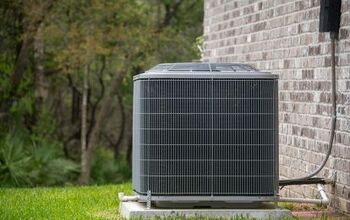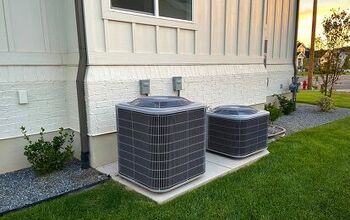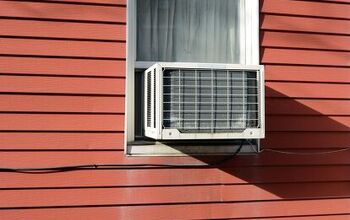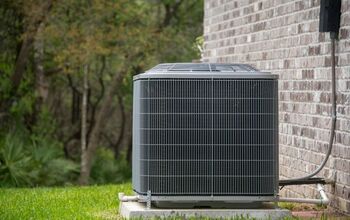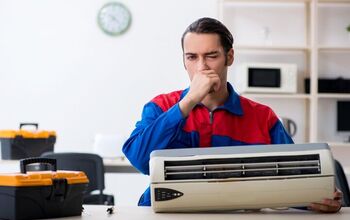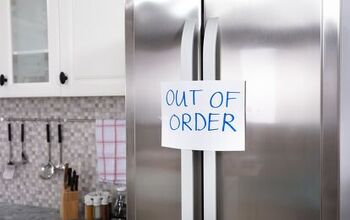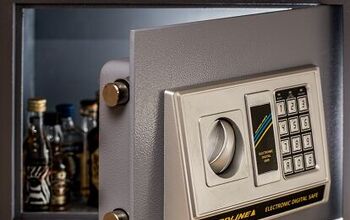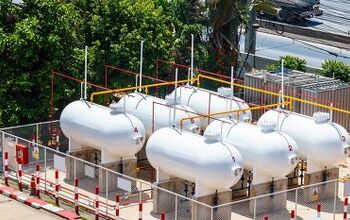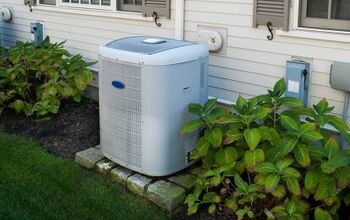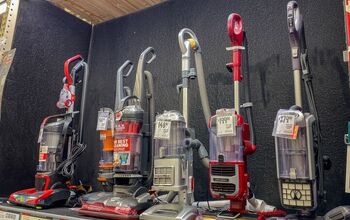Why Is My Air Conditioner Blowing Out Water?

It can be extremely inconvenient when your air conditioner decides to stop working correctly, especially if you’re in the middle of a summertime heatwave! There are many different issues that can occur, including your air conditioner blowing out water. But what exactly causes that?
The air conditioner will spew water out if the condensation drain is clogged. The water comes from your air conditioner’s Freon coils. When the coils begin to sweat, the water accumulates and drains through the vents—the water bursts out instead of draining if the drain isn’t working. A rusty drain pan and faulty installation can also cause this issue.
In this article, we will talk about what causes your air conditioner to blow out water and what you can do if you discover this problem. Let’s get started!
Consider How an Air Conditioner Works
An air conditioner draws heat from the environment and transfers it to the outside. Simultaneously, it replaces the heat with cooler air, lowering the temperature in the house. To fully understand how a malfunction occurs, we must first become acquainted with the mechanical aspects of the air conditioner and how it operates.
It all starts with the house’s warm air being pulled in through the vent. As it passes through a refrigerant, heat from the air blows over the evaporator coil. The refrigerant, also known as a cooling agent, is contained within coils that circulate within a closed system. The refrigerant becomes hot due to the heat from the surroundings, turning from a liquid to a gas.
The refrigerant’s temperature and pressure rise as it passes through a loop system and reaches the compressor. At this point, the Freon gas has become quite hot. The condensation process occurs when this gas is compressed between two solid objects, causing it to lose volume.
Finally, the cold liquid moves from the condenser to the evaporator coil, which begins to vaporize. The fan pumps cold air into the ducts, then into your home, repeating the cycle. This process is repeated until your home’s air temperature reaches the appropriate level.
What Causes the Air Conditioner to Blow Out Water?
Overfilling the condensate pan almost always results in noticeable volumes of water seeping from your air conditioner. And it occurs at the very end of the cooling process. When the air conditioner removes humidity from the air, the moisture condenses in the evaporation coils, forming droplets.
This water is used to cool the Freon coils and prevent overheating of the condenser. As a result, it’s not uncommon for up to 20 gallons of water from the slinger ring to escape through the air conditioner’s condensate drain.
On the other hand, the drainage system may be malfunctioning if the air conditioner blows water about the home or spits water from the front and inside the house. However, there are other explanations as well.
Rusted Drain Pan
The drain is utilized to collect condensate that occurs as humid air travels over the evaporator coils, as previously mentioned. As a result, the drain pan is placed below the evaporator coils. Therefore, if the drain pan becomes damaged or corroded, the air conditioner will begin to leak or blow water throughout the house.
You can, fortunately, correct this. If the drain pan is made of plastic, epoxy glue or waterproof caulk may be used to repair it. Plastic pans are easier to replace than repair. If the drain pan is metal, however, you may need to replace it.
Faulty Installation
A bad installation can easily degrade an air conditioner’s performance and efficiency. Leaky air ducts and inadequate airflow may come from improper installation.
Another factor to think about is the slope. Water can collect in the drip pan and spill over if a wall or window conditioner is positioned in an inappropriate slope, that is if it is tilted towards the inside instead of the outside. This can be fixed by adjusting the slope correctly.
Blockage in Drain System
The drainage system distributes water from the drain pan to the plumbing or outside to prevent overflowing. When a blockage occurs, the water in the drain pan has no method of draining, leading it to fill and overflow. Due to the force emitted by the circulation fan, this water may drip on the floor or blow around the house.
To fix this, suction the dust or dirt from the drainage hose with a wet or dry vacuum. Look for anything that may be blocking the condensation line and remove it.
How Do You Tell If Your AC Drain Is Clogged?
A moldy odor in the air, the unit blowing warm air, and traces of water damage on the unit are all common signs of a clogged drain line.
You can try to unclog your drain by removing the pipe cap and clearing out any visible material. HVAC professionals are ideally suited for a more comprehensive cleaning. It’s a good idea to frequently check this, especially before spring and summer, to ensure that your AC functions correctly.
Is it Dangerous to Have Water Leaking From Your AC?
Under normal circumstances, the water produced by your air conditioning system will not cause anyone harm. However, there are various issues to be concerned about if your unit has too much condensation because it is constantly running or plugged.
- Mold and mildew: Water could seep into your insulation if a clogged drain line causes the drip pan to overflow. Mold and mildew thrive in a warm, humid climate. In addition, depending on the amount of the leak, you may have a severe mold problem before you notice it.
- Sheetrock and insulation damage: Sheetrock is a delicate material that does not hold up well when wet. When your air conditioner leaks into sheetrock, it may cause a lot of damage in a short amount of time.
- Electrical complications: You don’t want the water to drip on any of the electrical components in your house or air conditioner. If it happens, a short may occur, resulting in damage to your air conditioning system. Before attempting any ac repairs, call an electrician if you feel that leaking water has damaged your electrical system.
What Should You Do If Your AC Unit Is Leaking Water?
All air conditioners produce condensation. If your system is working correctly and the condensate drain line is clear, there should not be enough water in the drip pan to overflow or cause water damage.
If water is leaking from your HVAC system, you should do a few AC maintenance tasks to avoid water damage and future damage.
Turn off Your AC
You should turn off your air conditioner as soon as you notice it is leaking. Once you’ve found the leak’s source, you can fix it and switch the unit back on.
If your evaporator coil is frozen, you’ll have to wait for it to thaw before a professional can work on it. It’s better to turn off your air conditioner until you figure out what’s causing the leak to reduce the chance of it sustaining any more damage.
Check For Ice
You should look for ice buildup in your system. Check your outside unit’s lines first. If your outdoor unit has ice on it, you’ll need to recharge your unit with Freon.
Next, inspect your air handler’s evaporator coils for ice. It would be better if you did not attempt to utilize your system while it was iced over. Using your air conditioner when either the indoor or exterior unit is frozen will not cool your home effectively and cause more harm.
Address Water Leaks
If you have a water leak or standing water in your home, you must clean it up right away to prevent deadly mold and mildew from growing. Suck up any standing water or water in the drain pan using a wet/dry vacuum.
Then, to dry out the problem area, turn some fans on and point it at the spot. Make sure you open some windows to for extra ventilation. If you suspect mold growth in your house, you should have it cleaned up by a professional as this can be dangerous.
Clean Your Condensate Drain Pipe
Condensate accumulates a lot of dust and debris, as well as condensation, in your condensate drain line. As a result, blockages can build quickly.
If water is seeping from your air conditioner, double-check that the drip pan is clear. It will overflow otherwise, causing even more water damage.
Do Not Use AC When it is Cold
When the temperature drops below 60 degrees, your air conditioner will freeze. This is a great time to open a window instead of using your air conditioner. Open windows, doors, and a couple of fans will work great when the weather is cooler.
Why Does My Air Conditioner Sound Like It Has Water In It?
Your window air conditioner eliminates humidity from the air in your room while it is running. To increase cooling, this moisture condenses under the fan and is spit or thrown back onto the coils.
This means that if you hear running water or water flowing about in your window air conditioner, it’s completely normal. Since this just means it’s operating correctly, you don’t need to do anything or try to drain the water.

Heather is a passionate writer who loves anything DIY. Growing up, she learned everything from home repairs to design, and wants to share her tips with you. When she's not writing, she's usually hiking or searching for her next DIY project.
More by Heather Robbins












